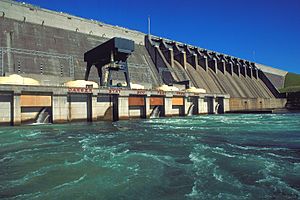Hartwell Dam facts for kids
Quick facts for kids Hartwell Dam |
|
|---|---|

Hartwell Dam water-control and power-generation structure
|
|
| Location | Anderson County, South Carolina / Hart County, Georgia, USA |
| Construction began | 1955 |
| Opening date | 1962 |
| Construction cost | USD $89,240,000 |
| Operator(s) | U.S. Army Corps of Engineers |
| Dam and spillways | |
| Impounds | Savannah River |
| Height | 204 feet (62 m) |
| Length | 3 miles (4,828 m) |
| Reservoir | |
| Surface area | 55,900 acres (22,600 ha) |
| Power station | |
| Turbines | 5 |
| Installed capacity | 421 MW |
| Annual generation | 468,000,000 KWh annually |
The Hartwell Dam is a huge structure built across the Savannah River. It sits right on the border between South Carolina and Georgia. This amazing dam creates a large lake called Lake Hartwell.
The U.S. Army Corps of Engineers built it between 1955 and 1962. They built it for several important reasons. These include controlling floods, making electricity, and helping boats travel on the river.
The dam is made of both concrete and earth. It stretches for about 3 miles (4,828 meters). The concrete part is 1,900 feet (579 meters) long. It stands 204 feet (62 meters) tall above the riverbed.
Today, Hartwell Dam produces a lot of electricity, about 468 million kilowatt-hours each year. It has also stopped over $40 million in flood damage. Plus, it provides fun activities like boating and fishing. It also helps manage water quality and supports local wildlife.
Contents
Building the Hartwell Dam
The idea for building dams on the Savannah River started a long time ago. In 1890, an engineer named Lieutenant Oberlin M. Carter suggested it. He worked for the U.S. Army Corps of Engineers (USACE). His main goal was to stop floods in Augusta, Georgia.
His idea was not acted upon right away. But in 1927, a new law allowed the USACE to study the Savannah River. They looked into how the river could be used for making electricity, helping boats, controlling floods, and watering crops.
In 1933, the USACE finished a big report about the entire Savannah River area. They suggested building two dams for hydropower. These were the Hartwell Dam and the Clark Hill Dam.
Starting Construction
The plan for Hartwell Dam was officially approved in 1950. Construction began in 1955. The original plan was for a 3-mile long dam. It would have four generators to make electricity. These generators would produce 264 megawatts of power.
Engineers also planned ahead. They made sure there was space to add a fifth generator later if needed. Part of the dam, 1,900 feet (579 meters), is made of concrete. The rest is made of packed earth.
Filling the Lake
In February 1961, about a year before the dam was fully finished, they started filling the area behind it with water. This created Lake Hartwell. By March 1962, the lake was complete.
The first four power generators started working in April 1962. The dam cost about $89.2 million to build. In 1983, the fifth generator was added. This increased the dam's power output to 344 megawatts.
Upgrading the Power Plant
By 1997, the first four generators had been working for over 30 years. They were getting old and needed to be updated. So, the dam's power plant went through a big upgrade.
Phase 1 of Upgrades
The first part of the upgrade started in 1997. Workers replaced and improved many parts. They fixed the generators and turbines. They also upgraded the circuit breakers and transformers.
Phase 2 of Upgrades
The second part of the project involved replacing all the switch-yard breakers. They also updated the main power station. After all these upgrades were finished, the dam could produce even more electricity. Its power capacity increased to 422 megawatts. This was a 22.7% increase in power!
 | Delilah Pierce |
 | Gordon Parks |
 | Augusta Savage |
 | Charles Ethan Porter |

